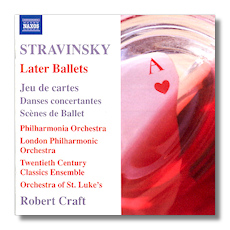
The Internet's Premier Classical Music Source
Related Links
- Stravinsky Reviews
- Latest Reviews
- More Reviews
-
By Composer
-
Collections
DVD & Blu-ray
Books
Concert Reviews
Articles/Interviews
Software
Audio
Search Amazon
Recommended Links
Site News
 CD Review
CD Review
Igor Stravinsky

Later Ballets
- Jeu de cartes 1
- Danses concertantes 2
- Scenes de Ballet 3
- Variations 4
- Capriccio for Piano and Orchestra 5
5 Mark Wait, piano
1 Philharmonia Orchestra/Robert Craft
2 Twentieth Century Classics Ensemble/Robert Craft
3,5 Orchestra of St. Luke's/Robert Craft
4 London Philharmonic Orchestra/Robert Craft
Naxos 8.557506
Naxos is releasing the complete orchestral works of Stravinsky as conducted by his longtime aid, the conductor and musicologist Robert Craft. Many of the CD sets in this series are reissues, and that is the case with all the material on this album: Jeu de cartes and Danse concertantes previously appeared on Koch International and Scenes de Ballet, Variations, and Capriccio for Piano and Orchestra were originally issued by MusicMasters. All recordings were made between 1993 and 2000, making them all fairly recent efforts.
Craft is one of the foremost experts in Stravinsky's music. As many may know, he had a big hand in most, if not all the recordings the composer made for Columbia in the 1950s and '60s. He definitely had a better ear for conducting than Stravinsky, since the composer was known to overlook errors and omissions by the orchestra during recording sessions, errors and omissions caught by the perceptive Craft.
Here Craft, you always sense, is very particular about bringing out specific details in the score, about shaping the character of the music in a particular, not generalized, way. In Jeu de cartes (1935-36), one of Stravinsky's more charming neo-Classical ballet scores, he draws out a fine performance from the Philharmonia, though some may find his treatment of the music here a bit antiseptic and stiff. But Stravinsky was never big on emotion and conducted his music in a similar fashion. Personally, I think the old Stravinsky reading on Columbia (now Sony) was marginally more spirited than this one, but Craft lets you hear so much detail, and so convincingly captures Stravinsky's humor and charm, that I'd have to rate this effort higher than the composer's. In fact, this would be my first choice in the work.
In Danses Concertantes (1941-42) Craft invigorates the work with sunlit energy and highlights its chamber-sized scoring in a way to make its happiness and chipper demeanor sound intimate one moment and good-naturedly rowdy the next. This may also be preferable to the excellent Craft recording made "under the supervision of the composer" in the 1960s, available on Sony. Certainly it is at least the equal and probably as good a version as has been put on record in recent times.
The Capriccio for Piano and Orchestra is a collaboration, of course, but I suspect Craft was more in control of the proceedings here than a conductor usually is. Again, you hear lots of detail often buried in other recordings, and while the soloist, Mark Wait, plays differently than Philippe Entremont did in the earlier Craft recording, again done "under the supervision of the composer", he plays convincingly. Entremont was more muscular in his approach, while Wait is lean and more neo-Classical in spirit. Both are fine performances, though I give the edge to Entremont.
In the other works Scenes de Ballet (1944) and Variations (1963-64), Craft again turns in detail-rich readings, capturing the heart of Stravinsky's score in each case. Variations is a late work, coming from Stravinsky's serial period. Craft, who introduced Stravinsky to Schoenbergian techniques, is especially incisive in this short piece. The sound in all works is good and the notes by Craft very informative. Highly recommended.
Copyright © 2008, Robert Cummings




















